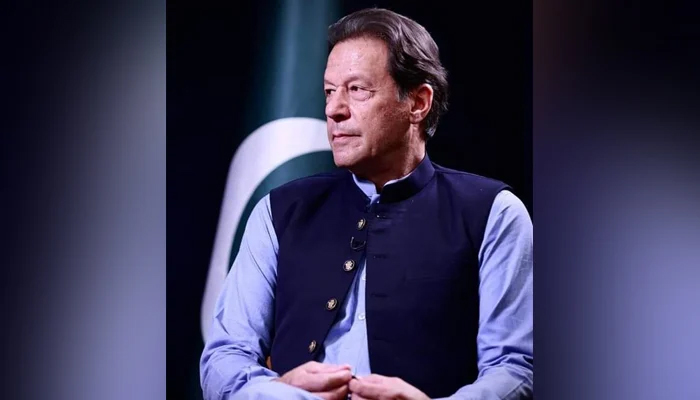Imran tried to talk to Modi after Balakot airstrikes, says ex envoy
According to Bisaria, then Pakistan Foreign Secretary Tehmina Janjua received message from army, saying 9 Indian missiles were pointed towards Pakistan
LAHORE: Former Pakistan Prime Minister Imran Khan had made a panic midnight call to Prime Minister Narendra Modi on February 27, 2019, following the Balakot airstrikes in a bid to avert a military crisis, reports Indian media citing a the memoirs of a former high commissioner to Pakistan.
In his upcoming book — The Anger Management: The Troubled Diplomatic Relationship between India and Pakistan — Ajay Bisaria notes that on the night of February 27, a day after Balakot airstrike conducted by the Indian Air Force, Pakistan feared an imminent attack from India. India had conducted an airstrike in Balakot on February 26 while Pakistan responded by conducting airstrikes in Indian-held territory and in an ensuing dogfight, PAF jets shot down two Indian jets and captured Indian pilot Abhinandan Varthaman.
According to Bisaria, then Pakistan Foreign Secretary Tehmina Janjua received a message from the army, saying that nine Indian missiles were pointed towards Pakistan and could be launched any time that day. The foreign secretary requested foreign envoys to report this intelligence to their capitals and ask India not to escalate the situation, notes Bisaria. As the crisis deepened, Imran Khan took a decisive step by requesting a midnight phone call to PM Modi, seeking urgent dialogue to defuse the escalating tension. The call was reportedly facilitated by the then Pakistani High Commissioner Sohail Mahmood, who contacted his counterpart in Delhi.
“At around midnight, I got a call in Delhi from Pakistani High Commissioner Sohail Mahmood, now in Islamabad, who said that PM Imran Khan was keen to talk to Prime Minister Modi. I checked upstairs and responded that our prime minister was not available at that hour, but in case Imran Khan had any urgent message to convey, he could, of course, convey it to me. I got no call back that night,” Bisaria says in his book.
Bisaria writes, “We were willing to send an Indian Air Force aircraft to pick him up but Pakistan refused permission; the optics of an Indian Air Force plane landing in Islamabad after all that had happened over the previous three days, was, of course, not acceptable to Pakistan.
“Even China, not to be left behind, had suggested that it could send its deputy minister to both countries to seek de-escalation. India had politely declined the offer,” he says.“One of them recommended to her that Pakistan should convey its concerns directly to India,” says Bisaria.
Bisaria says “Pakistan’s PM would himself make these announcements and the pilot would be returned to India the next day. He says India’s “coercive diplomacy” had been effective, its expectations of Pakistan and of the world had been clear, backed by a credible resolve to escalate the crisis.
“Prime Minister Modi would later say in a campaign speech that, ‘Fortunately, Pakistan announced that the pilot would be sent back to India. Else, it would have been ‘qatal ki raat’ (a night of bloodshed)”.
-
 Emily Ratajkowski Appears To Confirm Romance With Dua Lipa's Ex Romain Gavras
Emily Ratajkowski Appears To Confirm Romance With Dua Lipa's Ex Romain Gavras -
 Leighton Meester Breaks Silence On Viral Ariana Grande Interaction On Critics Choice Awards
Leighton Meester Breaks Silence On Viral Ariana Grande Interaction On Critics Choice Awards -
 Heavy Snowfall Disrupts Operations At Germany's Largest Airport
Heavy Snowfall Disrupts Operations At Germany's Largest Airport -
 Andrew Mountbatten Windsor Released Hours After Police Arrest
Andrew Mountbatten Windsor Released Hours After Police Arrest -
 Heidi Klum Eyes Spooky Season Anthem With Diplo After Being Dubbed 'Queen Of Halloween'
Heidi Klum Eyes Spooky Season Anthem With Diplo After Being Dubbed 'Queen Of Halloween' -
 King Charles Is In ‘unchartered Waters’ As Andrew Takes Family Down
King Charles Is In ‘unchartered Waters’ As Andrew Takes Family Down -
 Why Prince Harry, Meghan 'immensely' Feel 'relieved' Amid Andrew's Arrest?
Why Prince Harry, Meghan 'immensely' Feel 'relieved' Amid Andrew's Arrest? -
 Jennifer Aniston’s Boyfriend Jim Curtis Hints At Tensions At Home, Reveals Rules To Survive Fights
Jennifer Aniston’s Boyfriend Jim Curtis Hints At Tensions At Home, Reveals Rules To Survive Fights -
 Shamed Andrew ‘dismissive’ Act Towards Royal Butler Exposed
Shamed Andrew ‘dismissive’ Act Towards Royal Butler Exposed -
 Hailey Bieber Shares How She Protects Her Mental Health While Facing Endless Criticism
Hailey Bieber Shares How She Protects Her Mental Health While Facing Endless Criticism -
 Amanda Seyfried Shares Hilarious Reaction To Discovering Second Job On 'Housemaid': 'Didn’t Sign Up For That'
Amanda Seyfried Shares Hilarious Reaction To Discovering Second Job On 'Housemaid': 'Didn’t Sign Up For That' -
 Queen Elizabeth II Saw ‘qualities Of Future Queen’ In Kate Middleton
Queen Elizabeth II Saw ‘qualities Of Future Queen’ In Kate Middleton -
 Hilary Duff Reveals Deep Fear About Matthew Koma Marriage
Hilary Duff Reveals Deep Fear About Matthew Koma Marriage -
 Will Sarah Ferguson End Up In Police Questioning After Andrew’s Arrest? Barrister Answers
Will Sarah Ferguson End Up In Police Questioning After Andrew’s Arrest? Barrister Answers -
 Matthew McConaughey Gets Candid About AI Threat To Actors: 'Be Prepared'
Matthew McConaughey Gets Candid About AI Threat To Actors: 'Be Prepared' -
 Hailey Bieber Shares How 16-month-old Son Jack Blues Is Already Following In Justin Bieber's Footsteps
Hailey Bieber Shares How 16-month-old Son Jack Blues Is Already Following In Justin Bieber's Footsteps




